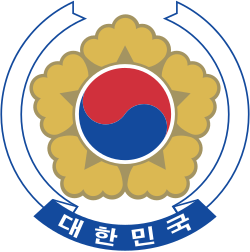Although corruption scandals marred the incumbent government, Lee Hoi-chang's campaign suffered from the wave of Anti-American sentiment in Korea generated by the Yangju highway incident. Public opinion of Lee, who was widely seen as being both pro-U.S. and the preferred candidate of the George W. Bush administration in Washington, D.C., suffered. After losing to Roh by 2% in the December 2002 elections, Lee subsequently announced his retirement from politics. [4]
Roh-Chung coalition
Chung Mong-joon, the 3-term independent congressman from Ulsan and son of Hyundai founder Chung Ju-yung, became so popular that he began appearing on polls for presidential election after he, as the president of the Korean Football Association, was credited for winning the right to host 2002 FIFA World Cup in Korea. [5]
Chung officially launched his presidential campaign in September, and in many polls beat Roh and came close to beating Lee. Many Democratic politicians that weren't happy with Roh's nomination joined Chung's campaign. However, when it seemed clear that if both Roh and Chung ran, Lee would win easily. The two sides decided to combine forces, instead of competing against each other.
The two sides agreed on conducting two polls, each by different polling companies, where the winner would run as the unified candidate. The winner had to win both polls, or a second round had to occur.
So the two poll was conducted on 24 November, but only one validated. The other one was invalidated, as the two sides had agreed that any poll with Lee Hoi-chang polling less than 30.4% must be invalidated, since there could be a chance that Lee's supporters were attempting to manipulate the results by responding with an untrue answer.
The only poll that was validated was the one conducted by the Research and Research, and it was won by Roh.
Consequently, Chung withdrew his candidacy and endorsed Roh. [6]
24 November 2002| Candidate | Research and Research Poll | # of polls won |
|---|
| Roh | 46.8% | 1 |
| Chung | 42.2% | 0 |
| Lee | 32.1% | - |
However, Chung later broke his pledge on the night before the election, when he felt that Roh broke the promise to include Chung in for policy decisions and surrounded himself only with Democrats. [7] Chung announced less than eight hours before the election that he was withdrawing his support for Roh and urged people to vote their conscience, but Roh won anyway.





